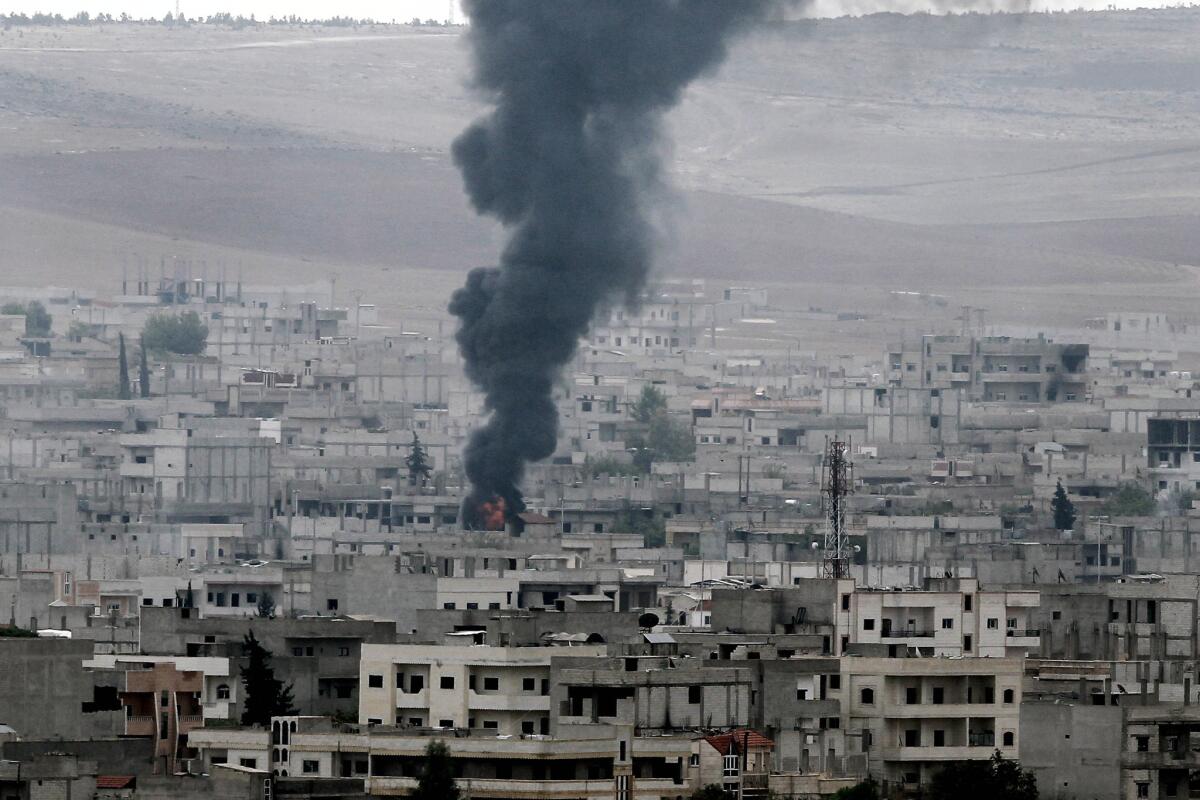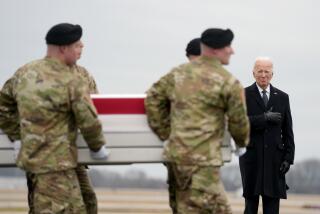U.S. airdrops arms, medicine to Kurdish militia on Syrian border

The U.S. military said late Sunday it used cargo planes to drop weapons, ammunition and medical supplies to Kurdish militia forces in the Syrian border town of Kobani to help them in their fight against Islamic State militants, who have been trying to overrun the town for weeks.
The aircraft delivered arms and supplies to the militia on the same day the Turkish government said it would not agree to transfer weapons to the Kurds in Syria. Turkish President Recep Tayyip Erdogan called the Kurdistan Workers Party, or PKK, a “terror organization,” according to the state-run Anadolu agency. Kobani’s Kurdish defenders are allied with the PKK.
“We cannot say yes to that if our NATO ally U.S. expects consent from us for such support,” Erdogan said.
A senior administration official said the airdrops were conducted by three C-130s that were not escorted by fighter jets for protection. The official said the Pentagon does not believe Islamic State has antiaircraft weapons.
The planes dropped 27 bundles of small arms, ammunition and medical supplies -- aid provided by the Kurdish authorities in Iraq, not the U.S., the official said. Early assessments showed the “vast majority” was successfully delivered, said the official, who refused to be quoted by name in discussing details of the operation.
The resupply mission marks an expansion of Operation Inherent Resolve, the war against Islamic State.
U.S. officials have been discussing the potential for such airdrops with Turkish government officials for several days, according to another senior administration official who briefed reporters on the operation on condition that he not be identified. President Obama called President Erdogan on Saturday and “was able to notify him of our intent to do this,” the official said.
Turkey, a reluctant partner in the U.S.-led mission, has supplied weapons and aid to rebel forces fighting Syrian President Bashar Assad. But it has refused to extend that support to the Kurds in Syria, who have ties to the PKK, which has long battled Turkey for greater autonomy.
The official said the president authorized the airstrikes to try to prevent a “humanitarian catastrophe” and a potential “massacre of civilians.” But the official also noted the mission was not solely motivated by humanitarian concerns. Islamic State forces have surged resources and fighters to the region as the Kurdish city teetered on collapse. U.S. officials also have come to see the fight as an “opportunity” to take out those resources swiftly.
“I think what this represents is that the president recognizes this is going to be a long-term campaign,” the official said. “And we need to look for any opportunity we can find to degrade ISIL,” he said, using another name for the militant group.
Until now, the U.S. has directed airstrikes against the militants in Syria. Although American military officials have been advising and closely working with security forces in Iraq, the U.S. has not had that partnership with militias in Syria, saying they first must be vetted.
Sunday’s airdrops show there’s now coordination between the U.S. military and Kurdish militia.
Kobani, also known as Ayn al-Arab, has been facing an onslaught from three sides since last month, forcing hundreds of thousands of people, most of them Syrian Kurds, to flee to neighboring Turkey. The area has been one of the most active fronts in Syria.
The Sunni extremists’ advance has been slowed in recent days in large part by U.S.-led airstrikes, now numbering 135 in the area, more than in any other part of Syria or Iraq since Obama approved the air campaign against Islamic State in August.
As Islamic State militants have seized buildings and moved equipment in a push to take over Kobani, they have created more targets for air attacks.
Warplanes have delivered punishing blows to the militants’ artillery, armored vehicles, communications gear and fighting units. Several hundred militant fighters have been killed in the bombings, according to Pentagon officials.
“The security situation in Kobani remains fragile as ISIL continues to threaten the city and Kurdish forces continue to resist,” U.S. Central Command said in a statement, referring to the militant group by an acronym for one of its former names, Islamic State in the Levant.
The airdrops were needed because Islamic State fighters have cut off Kobani from supply routes in Syria. Reinforcements from allied, Kurdish-controlled areas in northern Syria cannot help because they must pass through extremist-held territory to reach the city.
Turkish lawmakers recently authorized the country’s army, one of the region’s strongest, to push into neighboring Syria and Iraq to fight the militants. But the army has not moved in on Kobani.
Turkey has been alarmed at the establishment of pro-PKK, semiautonomous Kurdish zones in Kobani and elsewhere along the Turkish border in northern Syria.
“This assistance is another example of U.S. resolve to deny ISIL key terrain and safe haven as well as our commitment to assist those forces who oppose ISIL,” U.S. Central Command said.
On Friday, U.S. Army Gen. Lloyd J. Austin III, who heads Central Command, confirmed in a news briefing in Washington that Islamic State militants no longer travel in large convoys and are “afraid to talk on their networks.” But he acknowledged that it was still “highly possible” that Kobani could fall.
More to Read
Start your day right
Sign up for Essential California for news, features and recommendations from the L.A. Times and beyond in your inbox six days a week.
You may occasionally receive promotional content from the Los Angeles Times.








